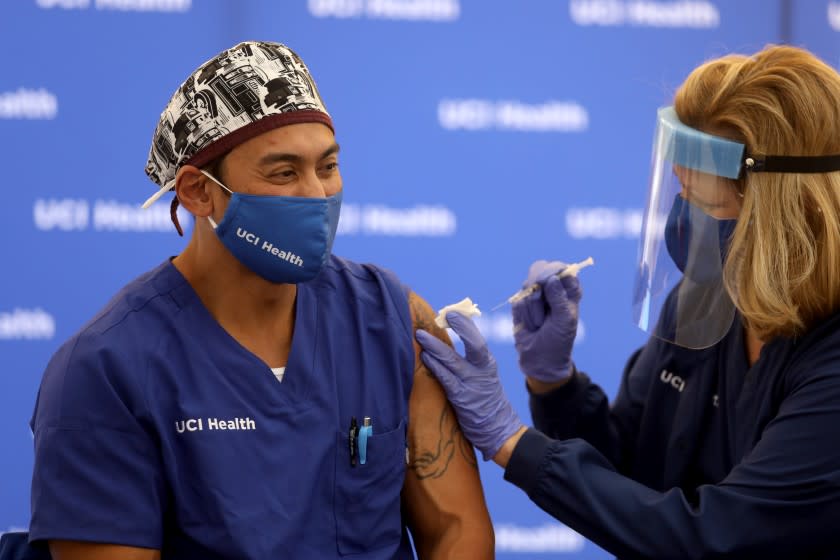O.C. embarks on a PR offensive to convince skeptics that COVID-19 vaccines are safe

As the number of COVID-19 infections continues to climb across Orange County — flooding hospitals and further straining the region's healthcare system — county leaders Tuesday approved hiring a public relations firm to help reassure residents about the safety and efficacy of the coronavirus vaccines.
The move came as county officials announced Tuesday that residents 65 and older are now eligible to receive the vaccine, marking a significant expansion in access.
The decision followed new guidance from the Centers for Disease Control and Prevention, and came ahead of the official recommendation from the state.
“My aim is to reduce hospitalizations and deaths as rapidly as possible, and we must prioritize our vaccine allocation to protect the most vulnerable in our community,” Dr. Clayton Chau, the county’s health officer and Health Care Agency director, said in a statement.
The developments are the latest signs of increased vaccine availability. On Thursday, California instructed counties to open the first phase of eligibility to a wider pool of workers in the healthcare industry, including public health field staff, primary care clinics, specialty clinics, laboratory workers, dental clinics and pharmacy staff.
The county also advised residents not to visit the newly opened vaccine site at Disneyland Resort without an appointment.
The Board of Supervisors voted to hire Costa Mesa marketing consultant Idea Hall to develop a plan to reach out to communities who have expressed skepticism about getting the vaccine.
Although county officials did not specify which communities they will be focusing on, a recent survey conducted by the Orange County Health Care Agency indicated that women, people ages 35 to 54, Latino and Black people and residents of Anaheim, Costa Mesa and Santa Ana showed the lowest willingness to be vaccinated.
"Is there urgency to what we need to do? Yes, because unlike testing, this requires education. Education and awareness takes time," said board Chairman Andrew Do. "You are not going to win over people with one ad, one touch, one encounter. You need multiple touches from multiple sources that they believe in ... to educate them of the process and then lower the resistance to vaccines."
Although the scientific evidence is clear regarding the safety and efficacy of the vaccines after trials involving tens of thousands of participants, including elderly people and those with chronic health conditions, some remain skeptical. The vaccines have been recommended for all adults except those who have had a severe allergic reaction to any of the ingredients.
The healthcare agency's survey, completed late last year, determined that "safety of the vaccine needs to be addressed in all groups, and some groups need to have the issues of protecting others through vaccination and the seriousness of the disease addressed."
Overall, 58% of the more than 26,000 survey respondents indicated they would be willing to be vaccinated against COVID-19.
The results are similar to a poll by the Associated Press-NORC Center for Public Affairs Research last year that showed only about half of the U.S. population planned to get the vaccine. That's a far cry from the 70% of the population that some experts estimate needs to be vaccinated to achieve herd immunity, or the point at which enough people are protected that the coronavirus will stop spreading rapidly.
"It is clear that willingness to be vaccinated for COVID-19 is much lower than past or present willingness to be vaccinated for the seasonal flu," the survey states.
As of last week, more than 56,000 people have been vaccinated in Orange County. The county has received 176,000 doses as of Tuesday from the state as it prepares to ramp up what has been a slower than anticipated rollout process. On Monday, the county announced the first of five large-scale vaccination centers — dubbed super POD (point of distribution) sites — would open this week at Disneyland in Anaheim.
Those eligible for the vaccine are people in the state's highest tier of priority, which includes workers in healthcare and long-term care facilities.
“Coronavirus has brought both a public health crisis and economic devastation,” said Anaheim Mayor Harry Sidhu. “With this super site, we will begin to overcome both. Every vaccination done in Anaheim will help to save lives and speed the reopening and recovery of our city.”
The county expects to be able to vaccinate 7,500 to 8,000 people a day at the large-scale centers. Ultimately, the county's goal is to complete all vaccinations by July 4, said Chau.
Chau urged county leaders Tuesday to quickly move forward with an outreach plan, warning that the flow of vaccines from the state to the county will slow down if they're not being used efficiently. Reallocations of vaccines have already occurred in other counties in California, he said.
Meanwhile, COVID-19 hospitalizations in the county hit an all-time high this month, further stretching the beleaguered healthcare system. As of Monday, 2,221 people were hospitalized with COVID-19. Officials said 544 of those people — mostly people older than 61 — were being treated in intensive care units.
Chau noted that the restrictions on businesses and gatherings will continue until the county can increase its ICU availability, which remains at 0%. He choked up as he told the supervisors about two grandparents who were the primary caregivers to their granddaughter — an eighth-grader — until they died of COVID-19.
"We need to do something fast in our community," he said. "It is not about just reopening our economy that is important. It's about taking care of our vulnerable community. Our seniors are dying and we need to do everything we can."
This story originally appeared in Los Angeles Times.

